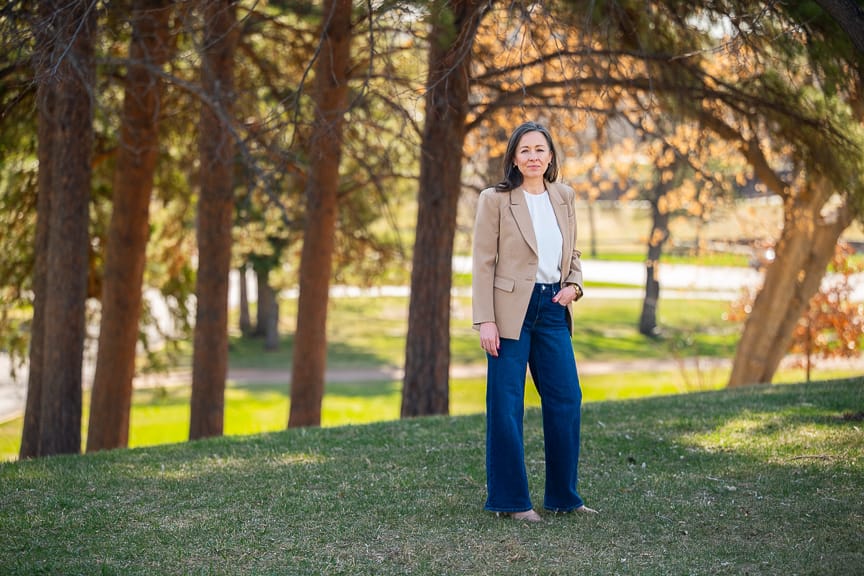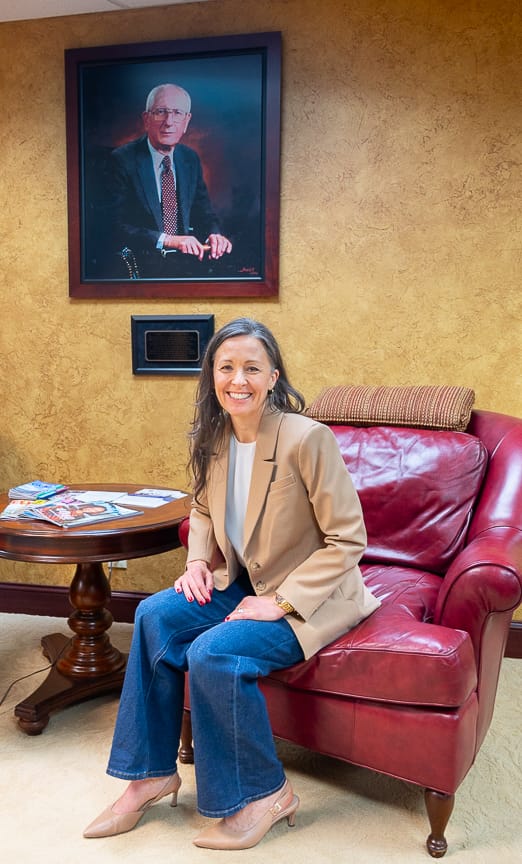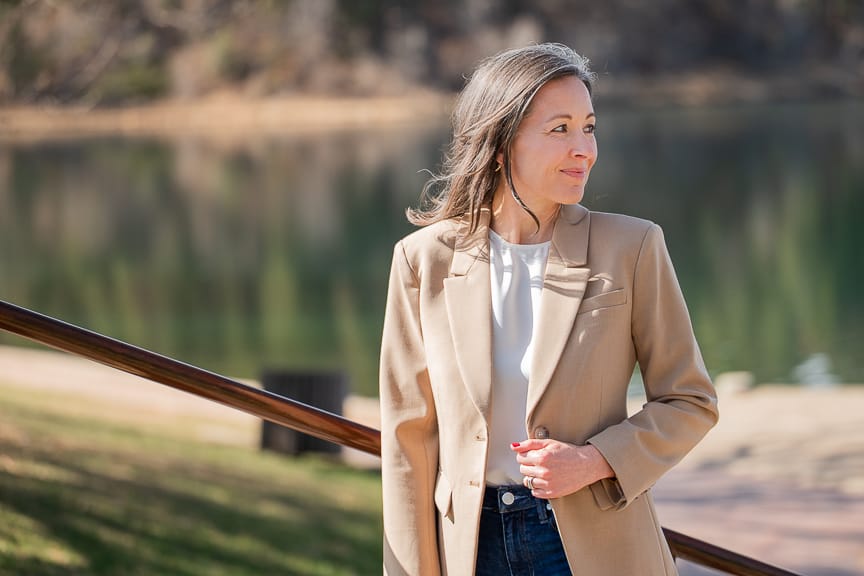Jacqui Dietrich brings a lifetime of connecting people and purpose to her new role as JTVF CEO
Jacqui Dietrich began understanding the importance of relationship building, especially in small business, as a young child.
Her maternal grandfather owned the oldest real estate business in Rapid City, and paternal grandfather helped to lay the region’s first telephone lines.
“I feel like some authenticity comes from that value set. It is an interesting thing to see multiple generations emerging in that lifestyle and career choices,” said Jacqui, whose two sons, Dorian and Daevin, also work for a local small business.

An Early Start in Entrepreneurship
At 19, Jacqui, originally from Spearfish, transferred from Augustana to Black Hills State University to help her then-boyfriend, now husband, Clint, run Adventure Sport, a small outdoor retail business with two locations, one in Spearfish and one in Rapid City.
That leap launched the teenagers on an epic journey —one that’s taken them across the globe and ultimately led Jacqui to a role she feels she has spent decades preparing for: becoming the newest chief executive officer of the John T. Vucurevich Foundation (JTVF).
Leading a Mission-Driven Organization
Jacqui started with JTVF, a philanthropic organization dedicated to helping low-income people meet their needs through grantmaking and community collaboration, in December.
“I feel very much in my element,” she said, seated in the foundation’s conference room, where posters of world-renowned speakers—brought to Rapid City each year by the foundation—line the walls. “But it is also a very challenging time to be walking into the field of philanthropy with everything that is happening at the federal and state levels. The uncertainty in our nonprofit community is through the roof.”
What gives Jacqui confidence is JTVF’s strong relationships and her own decades in the entrepreneurial landscape. “The work the foundation has poured into building those relationships is extraordinary. That has been a huge advantage to me being the new CEO.”

Hands-On Experience in Small Business
Fostering relationships and being the “connector” is what Jacqui is all about.
While helping Clint run Adventure Sport, Jacqui earned her degree in small business administration, bringing classroom lessons into their business. At the same time, she was helping run Wild Idea Buffalo Company, which became the country’s first regenerative organic buffalo operation.
“We certainly experienced our trials – drought years, economics ups and downs and navigating e-commerce,” Jacqui said. “Wild Idea was all based on e-commerce. We just ate, slept and breathed our businesses and had two kids at the same time.”
From South Dakota to Colorado – and a New Path Forward
In 2006, they sold Adventure Sport. The original plan was to move to Washington, D.C., where Jacqui had landed a position in shaping agriculture policy for U.S. Senator Tim Johnson. But life took a detour when Clint received a job opportunity with Oakley, taking the family to Colorado instead.
Walking around downtown Denver, hundreds of miles from the buffalo herds of rural South Dakota, Jacqui wondered what to do next.
Her background in rural economies and small business operations led her in a new direction. At Wild Idea, she’d seen the power of niche markets.
“We were shipping meat all over the country to politicians and food editors,” Jacqui said. “Wild Idea was featured in the New York Times and Gourmet magazine during that growth period. It gave me a different understanding of what’s possible in a place like South Dakota.”
Mentorship and the Power of Productive Collisions
She became a fellow in the Deming Center for Entrepreneurship at the University of Colorado Boulder, a program founded by pioneers of the organic food industry.
“These executives had built successful businesses creating new product categories like Horizon Organics and wanted to mentor the next generation of leaders,” Jacqui said. “That just set my trajectory in a whole new direction.”
Jacqui immersed herself in Boulder’s entrepreneurial culture, not as a business owner, but as the individual connecting the dots.
“I realized I didn’t want to own my own company. I loved being the enabler – connecting students, entrepreneurs, and researchers with clean companies.”
She called this work creating “productive collisions” – a phrase coined by a CU Boulder scientist.
“That is when everything clicked for me. I wanted to connect people solving problems in creative ways with like-minded individuals and investors to start changing the ecosystem.”
Creating “productive collisions” has been her roadmap since.

Building Inclusive Entrepreneurial Ecosystems
At CU Boulder, Jacqui focused on innovation and entrepreneurship helping changemakers address not just product development but workforce sustainability and environmental impact.
She later led a program with the City of Denver to create entrepreneurial opportunities for underserved communities–connecting entrepreneurs with mentors and access to capital.
“Often, these entrepreneurs come from no personal wealth, so how do we get them bankable?” she said. “We were always thinking about how to enable these processes and provide what they need to succeed.”
By the time she left, more than 60 entrepreneurs were running small businesses.
A Pivot into Tech and a Return Home
Through that work, Jacqui met a Florida-based Fortune 100 executive interested in creating a tech platform to improve the visibility of entrepreneurial resources.
Jacqui was the first client in Startup Space, a tool that expanded community connectivity and a critical piece of software during the pandemic for helping municipalities distribute small business relief funds.
“It was an awesome example of catalyzing deep resources and making that funnel smoother and more productive.”
Jacqui was working remotely with Startup Space when her family moved back home to the Black Hills in 2020. But after a few years of Zoom calls, she missed feeling rooted in her community.
In Denver, I was anchored in everything that was happening locally. I realized I missed that.”

Arts, Belonging, and a Reconnection to Philanthropy
That led her to join the Rapid City Arts Council (RCAC) as executive director. “The arts community has a lot in common with entrepreneurs,” said Jacqui, who visited the Dahl Arts Center as a child with her grandmother, a docent here in the ‘80s. “It’s about creating a sense of belonging for different groups.”
While leading RCAC, Jacqui secured national grants from the National Endowment for the Arts, the U.S. Department of Justice and JTVF, an ongoing funder of RCAC. Her work with the foundation sparked her interest in the CEO role.
“I was instantly attached to what the foundation was doing. It took me back to that connector role – understanding how important it is to have people who hold access to resources and just want to listen and help.”
Coming Full Circle: A Community Connector at Heart
Jacqui’s journey has come full circle, from small-town entrepreneur to national changemaker. She’s back in her home state, in a role she was meant to have: community connector.
“I wake up every day and look at the people in a room and think what is the good they can bring and how do we at JTVF capitalize that and strengthen our
community.”


